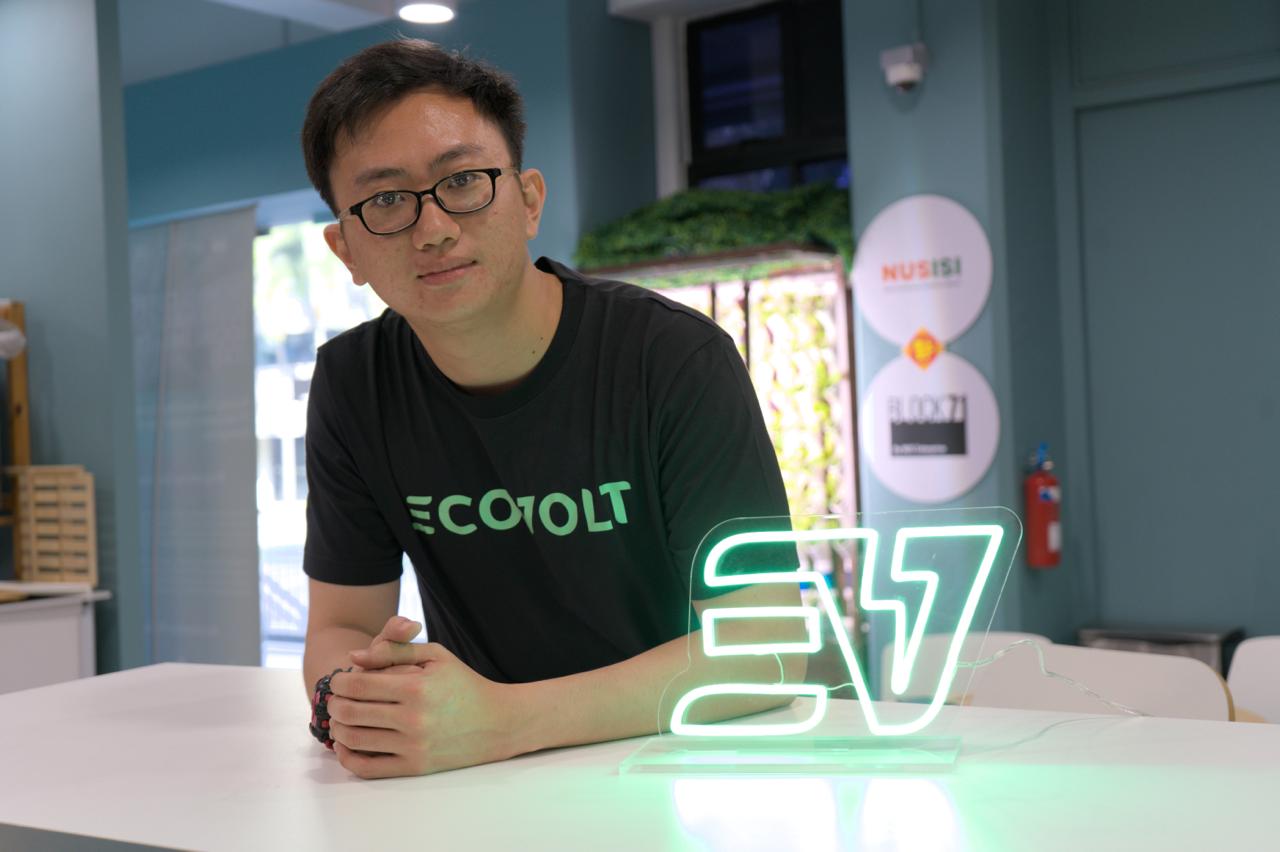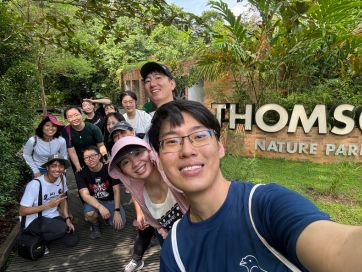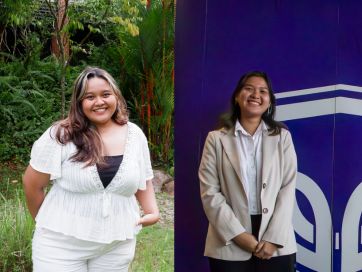At Ridge View Residential College (RVRC), Ho Wei Hao (Engineering ’25) developed a passion for student life, and an even deeper one for sustainability. This led to his involvement in founding Ecovolt in 2024, a sustainability-focused initiative driven by a multidisciplinary team from four different majors. While at NUS, Wei Hao and his team came together with a shared mission to address vampire energy waste. Drawing on his RVRC experience and engineering expertise, Wei Hao now leads Ecovolt’s hardware development to create practical sustainability solutions.
OSA caught up with Wei Hao to find out more about his journey and how he is driving change in the field of sustainable technology.
OSA: How has your time in RVRC shaped your entrepreneurial journey?
The opportunities provided by RVRC have shaped my perception and thinking as a leader and allowed me to develop critical skills for entrepreneurship such as communication, presentation, and long-term planning. My time at RVRC also gave me the chance to show my character and drive, which helped me build strong relationships with the Residential Fellows (RFs). One of them, Mr Desmond Ng, wrote the letter to facilitate my participation in the NUS Overseas Colleges (NOC) programme, which offers selected students internship opportunities at innovative start-ups worldwide. This became the first domino that motivated me to join the Ecovolt team.
OSA: What was your most memorable Student Leadership experience?
I served as the Vice Events Director of RVRC‘s Student Committee overseeing the first Inter-College Halloween Event held since the lifting of Covid-19 restriction in 2023. The theme was ‘Fairy Tales’ and our College was assigned the character of Snow White. On a spontaneous whim, I donned the costume and toured RVRC and UTown with a close friend. The stunt drew laughter and surprised stares, and I was even asked to take a selfie with someone.
It was not just about dressing up in a wildly unconventional way, it was about acting on my unconventional ideas and doing something new outside my comfort zone. The companionship of my close friends that night reminded me of their constant encouragement and support in other hard times in my university life. This also gave me more courage to try new unconventional things, like cosplaying during my time in NOC Malaysia to meet new people and make more friends. This contributed to my induction into the Ecovolt team, which became a safe space for my equally wild ideas.
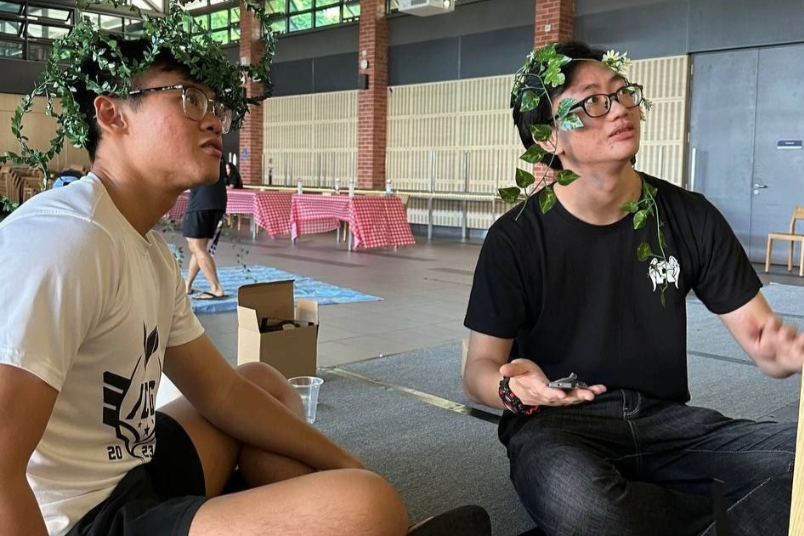
Wei Hao (right) and a fellow organising committee member preparing logistics for RVRC’s Busking x Self Care Night 2023, an event aimed at promoting mental wellness amidst the busy semester.
OSA: Ecovolt brought together NUS students from four different majors. What are some key takeaways from working with such a multidisciplinary team?
The Ecovolt leadership consists of:
- Raphael Chew (Year 3, Business Administration), CEO leading sales and manufacturing,
- Eugene Chia (Computing ‘25), COO handling company operations,
- Glenn Quah (Year 3, Information Systems), CTO developing software, and
- myself (Engineering ‘25), CPO in charge of hardware product development.
One of the biggest takeaways has been learning to translate our ideas across disciplines. Being a small team, it’s essential to understand each other’s work and needs, even as we manage our own areas. This means explaining our knowledge in ways others can grasp and act on. For example, I explain hardware progress to Glenn in terms of integration points for cohesive teamwork. With Eugene, I focus on project milestones and operational needs to keep operation timelines on track. With Raphael, I simplify technical explanations, highlighting functions and results for effective communication to clients and manufacturers.
We’ve also learnt the importance of frequent and clear communication. It’s easy to become siloed, so we hold regular meetings and update one another often. In the office, Glenn and I sit near each other to stay aligned on technical progress, while Eugene and Raphael coordinate on sales and operations sit opposite us. We frequently cross over to have quick chats to ensure we are all on the same page.
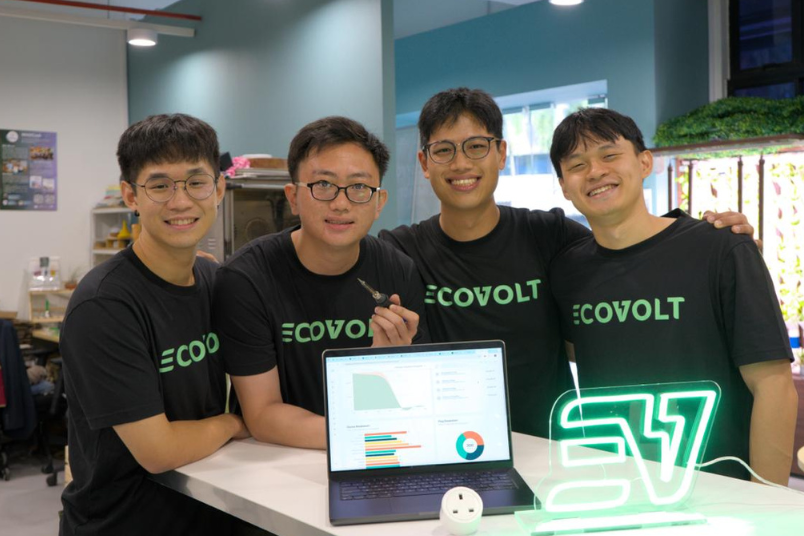
Wei Hao (second from the left) with his Ecovolt teammates — Glenn Quah, Eugene Chia, and Raphael Chew — at BLOCK71 Social Impact Hub, a social-impact forward startup hub and co-working space by NUS Enterprise.
OSA: Ecovolt tackles the issue of vampire energy waste. Can you explain in simple terms what vampire energy waste is?
Vampire energy, also called phantom energy or idle energy, refers to the electricity consumed by devices in standby mode when not in active use. While standby mode was originally designed to reduce energy use and keep devices ready for quick activation, prolonged use—especially in corporate or shared spaces—often leads to unnecessary energy consumption. Devices in such spaces often remain idle for extended periods, sometimes overnight, resulting in significant energy wastage over time.
My time in RVRC deeply ingrained in me the importance of sustainability. So, when Eugene called to ask if I was interested to join the cause, I saw it as the perfect opportunity to align my technical expertise with my personal values. Once I came onboard, I introduced the teams to RVRC’s goals and its other sustainability projects, which then shaped the direction of our plans. For instance, observing how other sustainability initiatives were implemented in RVRC inspired our roadmap for integration into actively used spaces.
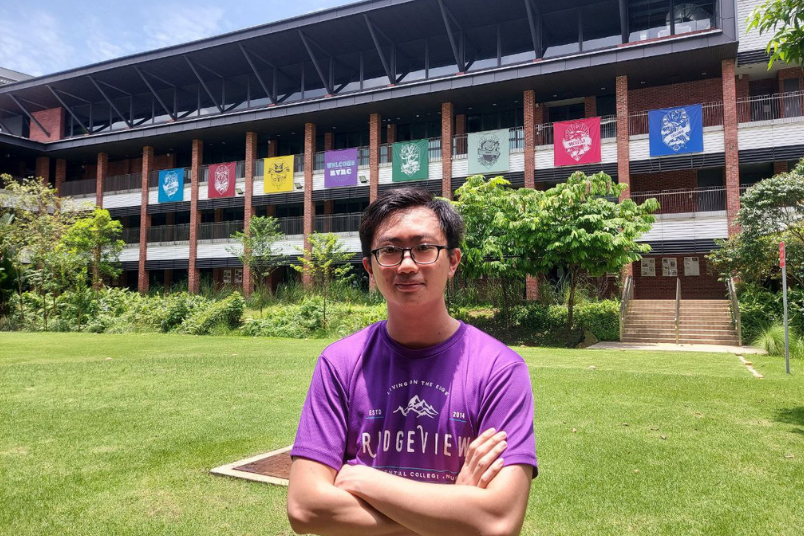
Wei Hao standing in front of RVRC’s common Block G, where student-led sustainability projects are conducted.
OSA: Any advice to your juniors at NUS/RVRC on how to make full use of their time as undergraduates at NUS?
Personally, I’ve lived by three simple rules throughout my university life, and they have been embodied throughout my journey which led me to Ecovolt.
First, before jumping into any opportunity, take a moment to reflect on what you truly hope to achieve, no matter how ambitious it may seem. Let that clarity guide your decisions and actions. Second, while staying focused, stay open. Some of the most meaningful experiences often come from the most unexpected places. Third, take bold steps, even if they feel awkward or unconventional. Growth almost always begins outside your comfort zone.
So be intentional, but adaptable. With purpose and an open heart, your four years at NUS can be more transformative than you ever imagined.
This is the second of a three-part series celebrating the student life achievements of our graduands from the Class of 2025. Click here for info on NUS Commencement.
Share:
Contributor
Office of Student Affairs


